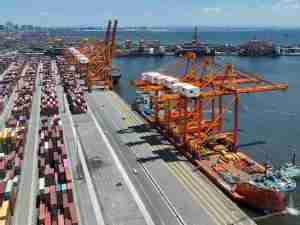CHS will end 2012 having traded 4 million tonnes of grains in Brazil and Argentina worth $1.5 billion out of its record sales of $40.6 billion this year. That piece will grow, along with the importance of the region as a major supplier of grains, Stefano Rettore, head of South America operations, told Reuters.
The company plans an ambitious expansion in South America as the region contributes more of the global food supply, especially after the worst drought in 56 years curbed U.S. production this past growing season.
"CHS has grown in South America at 40 percent per year (in the movement of goods) in the last five years, and our plan is to continue growing at 20 percent per year over the next five years," he said.
The flow of grains moving across CHS' trading desks in the region will grow to 8 million tonnes, a volume equivalent to 10 percent of Brazil's expected 2012/13 soy harvest, he said. Fertilizer sales could total 1 million tonnes, up from the current 300,000 tonnes.
Brazil, which will likely surpass the United States as the world's top soybean grower this year, accounted for 70 percent of CHS' South America's sales, mostly in soybeans.
CHS sold its participation in the Brazilian trader Multigrain for $225 million to Japan's Mitsui last year and has changed its strategy to focus on the fast-growing Brazilian Cerrado - a vast tropical savannah spanning the country's center-west and northeast, Rettore said.
CHS is a diversified energy, grains and foods company owned by farmers, ranchers and other cooperatives across the United States and provides services, marketing, supplies and insurance to its members.
It bought a 25 percent stake in a grains terminal at the Itaqui port in the northeast state of Maranhão, which will be an important export corridor for Brazil's main center-west soy belt by 2014 and for the growing agricultural frontier farther north.
It also acquired 100 percent of Atman, a firm in central Goias state that specializes in bartering, or exchanging fertilizers and other inputs like seeds and pesticides for grains, and bought 50 percent of logistics firm Andali, which has fertilizer operations in Brazil's main grain port of Paranagua.
In 2013, CHS plans to double capacity to mix fertilizer in Paranagua and build grain silos in Mato Grosso state, Rettore said, though he declined to give details on the size of the investment.
The firm will also enter Brazil's sugar cane-based ethanol business, focusing on sales and logistics rather than production in the same way it operates in the U.S. corn-based ethanol industry, he said.
CHS, which also operates in Eastern Europe, will increase its presence in South America by opening offices in Paraguay and Uruguay.
But Brazil, one of few countries in the world with the territory and technology to boost grains output in the coming years, will be the main impetus for growth, he said.
"Our customers can rest assured that Brazilian agriculture is able to meet demand, the availability of land is immense, Brazil has the potential to grow a lot in coming years," said Rettore, an Italian national with dual citizenship and 12 years experience in Brazil.
He believes Brazil will harvest 90 million tonnes of soybeans in 2018, after passing the 80-million-tonne mark this season with what should be a record harvest.
One of the greatest threats to Brazilian agriculture, however, is logistics, Rettore said. Producers and traders fear that the lack of roads, storage capacity and ports will delay exports early next year, when Brazil tries to move expected record soybean and sugar crops, as well as a bumper corn crop.
That is why CHS is betting on the Itaqui port, he said.
"We are convinced that Brazil's future exports will pass through the north," he said. (Reuters)










